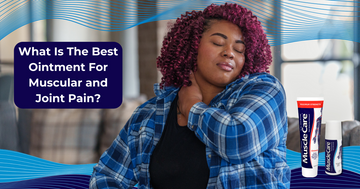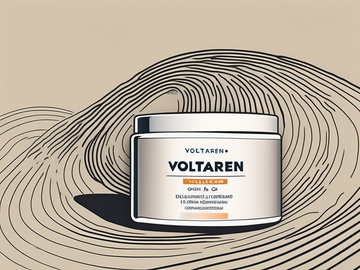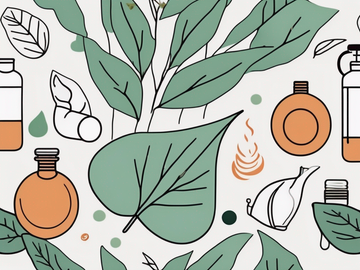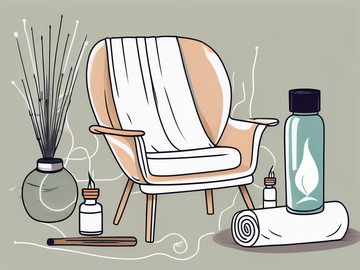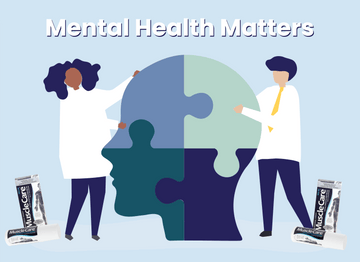

Almost every day, we’re waking up to bad news continuously occurring all over the globe, and sometimes in our own neighborhoods. Although we can’t control other people and scenarios that are much larger than us, we can control how we react to them and how we let it all affect us. Following the right habits and lifestyle to guarantee a stable and healthy mindset is one of the best favors you can do for yourself, especially during these crazy and unpredictable times.
According to the Canadian Mental Health Association, around 8% of adults will experience major depression at some point in their lives, and 49% of those who feel that they’ve suffered from anxiety or depression have never gone to see a doctor about this problem. CMHA suggests that a big reason why adults don’t get treated for anxiety/depression is that there’s a “stigma or discrimination” attached to these mental illnesses and adults may have a fear of not being accepted in society. 
Dr. Chris personally has also seen a decline in teen mental health over his 32 years of practice. He’s observed that kids are resorting to street pills for recreational use, many frontline workers lack adequate training because they’re too quick to prescribe antidepressants, divorce rates are higher than ever, and the chemicals in sugar and candy are negatively affecting their brains. On top of all of that, today’s teens are a part of the “social media generation.” They’re constantly exposed to unrealistic lifestyles and beauty standards, and social media addiction is diminishing their attention spans - distracting them from school and real life.
Here are some tips and lifestyle changes to improve your overall mental health.

Meditation
If you’re new to meditation, this may seem silly or a little too “out there” for your taste, but it has been scientifically proven to reduce anxiety, depression, and psychological pain. On top of that, it’s been known to be beneficial for sleep, overall mood, and cognition.
You’ve probably meditated before and didn’t even realize it. Any time that you take a few minutes to clear your mind, drown out the noise around you, and focus on your breathing, you’re meditating! This is especially helpful when you’re feeling overwhelmed or stressed out, and you need to take a second to calm yourself down.
There are dozens of apps in the mobile app stores to help guide you. Our personal favourites are “Calm” and “Headspace.” If you don’t want to download an app, there are thousands of guided meditation videos on YouTube. Here is a 5-minute Meditation for Beginners video to get you started.
Exercise
Exercise is the ultimate natural treatment to anxiety and depression. According to HelpGuide, “studies show that exercise can treat moderate to mild depression as effectively as antidepressant medication,” and it also is a “natural and effective anti-anxiety treatment” because it “relieves tension and stress, boosts physical and mental energy, and enhances well-being through the release of endorphins.”
A recent study from Harvard T.H. Chan School of Public Health found that the risk of major depression is reduced by 26% when a person engages in daily physical activity as simple as 15 minutes of running or one hour of brisk walking.
Stretching has also been proven to release endorphins and relax your body. Here is a FREE DOWNLOAD to Dr. Chris’ Daily Stretch Routine from his bestseller, Stretching for Fitness, Health, and Performance. If you are a senior, here is a FREE DOWNLOAD to Dr. Chris’ Senior Stretching Routine.
Dr. Chris and Dr. Sid are both big cycling fans. They appreciate the massive benefits that high-intensity exercise and long-term cardio have on their own stress and strain. Riding outside is a great way to get fresh air and spend time in nature or explore your city. However, with the winter coming, they suggest a Peloton bike to stay indoors. Dr. Chris says the Peloton is one of the best-designed bikes on the market today because the ergonomics are perfect for anyone from 4’8 to over 6’0.
When following a regular exercise schedule, you will have a sharper memory and thinking, higher self-esteem, reduced inflammation, better sleep, more energy, and stronger resilience when exercise is used as a coping mechanism instead of unhealthy habits.

Diet
Your brain is the engine that keeps your body moving. When it doesn’t receive the fuel it needs, it will shut down. If it receives fuel that isn’t the best quality, it’s not going to produce great results; do you see where we’re going with this? Your body needs clean, whole foods that provide the vitamins, minerals, and antioxidants that it requires to reach its full potential.
Diets full of processed foods and refined sugars can cause damage to your body and brain by decreasing your body’s regulation in insulin, worsening your mood and causing depression, and promoting inflammation and oxidative stress.
Processed foods are okay in moderation, but they definitely shouldn’t be a part of your everyday diet.
We suggest trying out a clean diet for 2-3 weeks and documenting how you feel along the way. A clean diet means cutting out all processed foods and refined sugars and replacing them with whole foods like fresh fruits, vegetables, seeds/nuts, lean meats, fish, etc. You will notice a difference in your overall mood and energy levels.
Sleep
Sleep and mental health are much more connected than you may think. Have you ever pulled an all-nighter? Maybe it was back in college or when you were working on a big project for your job. Maybe it was when your child was a newborn who didn’t allow you to get much sleep. How did you feel the next day? A lack of proper sleep will make someone feel groggy, almost like his or her brain is slowing down.
Sleep issues are even more common in patients with anxiety, depression, bipolar disorder, and ADHD. Insomnia can be both a symptom and a cause of mental illness. When one is anxious about something or experiencing negative emotions, it can be challenging to relax and fall asleep.
Studies have shown that depressed patients who experience insomnia are less likely to respond to treatment than those who don’t have sleeping problems.
In a longitudinal study of 1,014 teenagers, it was found that insomnia developed before major depression did. The sleep problems preceded anxiety disorders 27% of the time, while they preceded depression a whopping 69% of the time.
Some lifestyle changes that you can make to increase your chances of a good night’s sleep include:
- Cutting out stimulants such as caffeine, alcohol, and nicotine
- Putting your phone away once you get into bed
- Meditate before falling asleep to promote calmness
- Participating in a regular exercise schedule to release built-up energy during the day
- Making sure that you’re sleeping on a good mattress. We suggest purchasing a Tempurpedic mattress topper for back support and comfort.

Chiropractic Care to Help Both Acute & Chronic Pain
Chronic or acute pain is one of the leading causes of suffering from mental health. The mind and the body are connected, so when your body isn’t feeling well, neither will your mind, and vice versa.
Every day, we are stressing our neck and back alone by constantly looking down at our phones - in line at the grocery store, at work, in the kitchen, etc. This is ruining our posture, and even worse, we are aggravating the cervical-thoracic junction, which is at the top of the sympathetic nervous system. When our heads are down, our fight-or-flight response stays activated, and we cannot relax. Chiropractic adjustments can reset the proper alignment in the spine and calm down the sympathetic nervous system.
If you’re suffering from chronic (over 6 months) or acute (less than 6 months) pain, it’s almost impossible to focus on anything else besides that. How are you supposed to meditate or exercise if your body is in pain?
A series of chiropractic adjustments will help you overcome that pain and let your mind finally relax and focus on what brings you joy again.

MuscleCare
MuscleCare will also help with chronic and acute pain.
Pain can affect our performance during the day and also our sleep at night. If we aren't able to complete daily tasks or have a good night's sleep because of some pesky pain, chances are, we're going to have a bad week.
Avoid that stress with MuscleCare, a bio-innovation in magnesium absorption. It works by pushing magnesium into your skin and through your muscles to push the pain out. The best part about it is that it has a cooling effect that will give you instant relief, so you can continue on with your day and have one less thing to worry about.
Massage Therapy
Massage therapy is the hands-on manipulation of the body’s soft tissues including, muscles, connective tissues, tendons, ligaments, and joints. It acts directly on the muscular, nervous, circulatory, and joint systems to help optimize their function.
Massage can also help reduce mental health symptoms such as headaches, fatigue, muscle pain, and sleep disorders. It does this by increasing blood circulation, lowering your heart rate, and releasing tension.
One of its biggest superpowers is that it lowers the levels of cortisol, a stress hormone that is responsible for depression, anxiety, increased blood pressure, impaired memory, and other mental health disorders (ThriveGlobal).

Clean/Declutter
Is your home or office cluttered and messy? When your personal space is filled with junk that’s unnecessary or out of place, your brain will get stressed out, and your mental health will automatically decrease.
It’s hard to motivate yourself to clean when you’re feeling depressed or anxious. However, once you bite the bullet and get it done, you’ll not only have a nice environment to exist in, but you’ll also feel accomplished which will increase your self-esteem.
Break it up into smaller tasks. Set a timer for 15 minutes every day and clean as much as you can within that time frame - you’ll be amazed at what you can accomplish. The small amount of time is less daunting, and you’ll be more willing to clean because it’s not that large of a commitment.
While you’re at it, open the windows and let some fresh air into your home. Another easy trick to help relieve stress in your space is to light a candle or activate your essential oil diffuser. Plants are also a great addition if you’re looking for air purifiers.
If your home feels cluttered, try to get rid of everything you haven’t used in a year (within reason). Have you ever heard of the KonMari method? It’s a procedure created by Marie Kondo, a professional organizer. In a nutshell, it tells you to go through everything in your home and ask yourself whether or not it “sparks joy.” If the item brings you happiness and peace, you hold onto it. If you feel indifferent about the item, get rid of it.
As humans, we hold onto so many material items that we never use, and all they do is create clutter and collect dust, much like the emotional baggage we carry around with us. Let go of unused items to not only clean out your home but also your mind.
Take Breaks from the Internet
We are surrounded by technology. We have devices in almost every room of our home or in our pockets at all times - smartphones, desktop computers, laptops, televisions, Amazon Alexa, video games, tablets, etc.
While the internet can be an enjoyable and educational space, it can also distract us from real life and decrease our wellbeing.
Social media and video games are both highly addictive. Sometimes, we can spend hours scrolling through Instagram or playing a game without even realizing how much time has truly passed.
When we spend all day on technology with our eyes glued to the screen, we usually aren't as productive as we could have been otherwise.
When we stay off our phones and are productive, we feel accomplished and confident. Without the internet, we are more likely to go outside and be active in nature, or spend quality time with our loved ones.
We suggest that you avoid checking your phone when you first wake up in the morning. Keep your phone on Airplane Mode for an hour. Let yourself make coffee, enjoy breakfast, read the newspaper, stretch, and do whatever else you need to do to set your day up for success.
We also suggest that you put your phone on Airplane Mode an hour before you go to sleep. When your phone is on when you're getting ready for bed, it can keep you up for hours. You might get distracted on social media in the bathroom when you're brushing your teeth, or maybe you'll end up mindlessly scrolling until 4 a.m. in bed.
Give your eyes and mind a break in the mornings and evenings. This will improve your sleep and mental health, and your brain will thank you.
Our body and mind are connected. When one isn't doing so well, the other will also suffer. We at MuscleCare believe in being the best and healthiest versions of ourselves, and we want the same for you.

